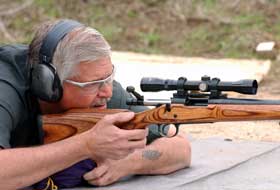Folks on The Gun Zone, the most professional of the on-line gun forums, have brought up some really interesting points regarding the firearms industry establishment's apparent disregard for sport shooters, as opposed to hunters.
The biggest point is what I'd call the "hang together or hang separately" issue, i.e., antigun forces stand to benefit from any schism between hunters and non-hunting shooters. That's certainly a fair point. However, I don't think there needs to be a break between the two groups. It would not take much for the hunting side of the industry to accept and acknowledge that the shooting sports represent 1) a viable alternative to field sports and 2) an alternative marketing resource for the hunting industry.
As our forefathers noted, taxation without representation — which is what we're talking about here — is not only tyranny, but sucks in general. I've been surprised at how many shooters had no idea they were being taxed to pay for wildlife/hunting programs. Excise taxes are, of course, invisible taxes, added to the cost of the product before it reaches the consumer. Of course, just because you don't see it doesn't mean it's not there.
I think it's GREAT we're being taxed for wildlife restoration, rehabilitation, land aquisition, hunter safety courses even hunter recruitment and retention. All those are vitally important issues both for us as shooters and the quality of life in America as a whole.
However, I also think it's not irrational to have a portion of those taxes collected used specifically for what it is that we do, sport shooting. Ranges are under pressure around the country; perhaps more insidiously, there's increasing pressure to disallow shooting, traditionally part of the "mixed-use" formula, on Forest Service lands close to urban areas — an issue that's going to be looming large here in Colorado.
I also don't think it's irrational for the firearms industry to make an effort to discover what issues are important to the shooting side of the culture. As much of an egoist as I am, I don't actually believe that it's up to me to set any agendas. The brutal truth is that right now, NO ONE speaks for the shooting sports. No one.
I've attended and spoken at two NSSF Shooting Sports Summits. I didn't keep track at the first one (they're held every two years), but at the second Summit out of three days of speakers/programs, there were exactly two independent presentations NOT about hunting...mine and one other range owner who talked about using the shooting sports to drive range visits. I was there with several representatives of the handgun companies, who just shrugged their shoulders. "We don't count," one said.
We need a way to make sure we count. The easiest would be for NSSF to create a position of Sport Shooting Coordinator — something I've proposed before — and a Sport Shooting Council made up of the heads of the various disciplines. Then get everybody together in a room for a little chat about our common goals and problems. THEN let's talk about allocation of resources!
MikeO makes a point in The Gun Zone Forum: Don't fight the spin; be a spinner.
He's absolutely right. The irony is we know how to spin. We know what needs to be done to, essentially, "take back the culture." We know what works.
Tuesday, April 05, 2005
Subscribe to:
Post Comments (Atom)

1 comment:
I'm sure those on the hunting side of the equation will scream bloody murder but in the interests of balance and objectivity, some of the tax money collected SHOULD BE SET ASIDE for range development in each of the 50 states. Urban sprawl is killing our sport.
In those areas where it is easy to find a place to shoot a centerfire rifle, few have the disposable income to afford anything other than the basic entry level model. In those areas where the disposable income would support the higher end rifle and handgun products in the market, there are few ranges available or convenient in which to enjoy these products.
Additionally, in some states like my home state of Indiana there are NO ranges open to the civilian that allows shooting a centerfire rifle at a distance greater than 300 yards. Indiana has several race tracks where the enthusiasts can drive his Corvette at the upper levels of its physical limits in terms of terminal velocity, but no where can a long range shooter practice or develop his skill past 300 yards. Naturally, centerfire rifles are relative slow sellers as a result.
Things should be changed.
All The Best,
Frank W. James
Post a Comment